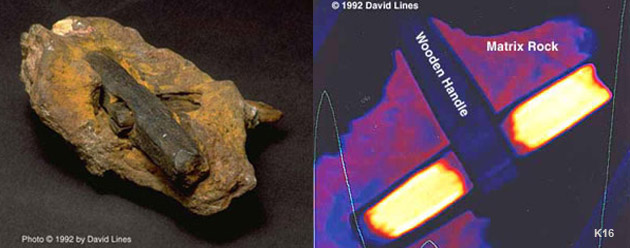
No higher resolution available.

|
This image was uploaded to the shared "Image Pool" and is usable on any CreationWiki site.
Please go to the Pool to edit its description.
|
Summary
The London Artifact was found near London, Texas in Kimble County. The site is part of a large geographical zone called the Edwards Plateau. It primarily consists of Cretaceous rock. In June of 1934, Max Hahn discovered a rock, sitting loose on a rock ledge beside a waterfall outside London, Texas. Noticing that this weathered rock had wood protruding from it, he and family members cracked it open with a hammer and chisel, exposing the hammerhead to the light of day for the first time since the stone formed around it. To verify that the hammer was made of metal, they cut into one of the beveled sides with a file. In the resulting nick, bright, shiny iron was exposed. The bright metal in the nick is still there, with no detectable corrosion. The metal hammerhead is approximately six inches (15.24cm) long with a nominal diameter of one inch. This seems somewhat small for a gross pounding instrument, suggesting that this tool was meant for fine work or soft metal.
Copyright status:
Fair Use: Publicity Photo by Creation Evidence Museum of Texas
Licensing
Template:Non-free promotional
Source:
http://www.creationevidence.org/displays/london_artifact.php
File history
Click on a date/time to view the file as it appeared at that time.
| Date/Time | Thumbnail | Dimensions | User | Comment |
|---|
| current | 16:41, 6 November 2017 |  | 630 × 248 (46 KB) | Braydenwilliams152 | The London Artifact was found near London, Texas in Kimble County. The site is part of a large geographical zone called the Edwards Plateau. It primarily consists of Cretaceous rock. In June of 1934, Max Hahn discovered a rock, sitting loose on a rock... |
File usage
The following page uses this file:
